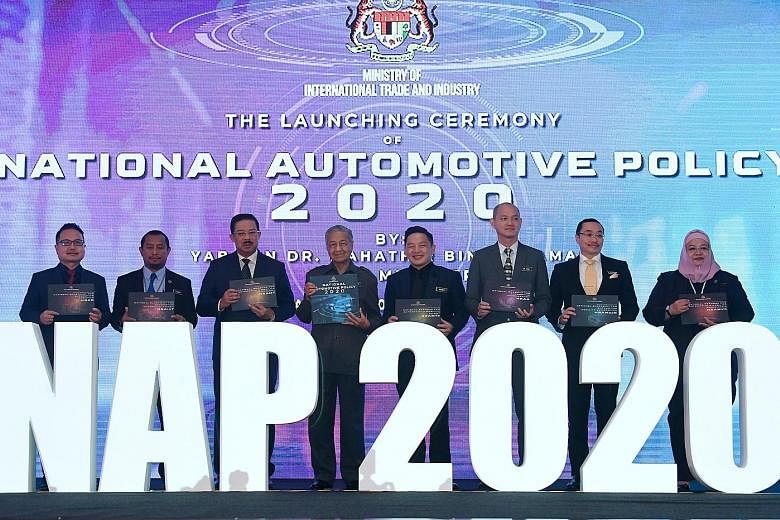Malaysia launched a new road map yesterday to revive its stagnant automotive industry, aiming to more than double the sector's contribution to the economy from 4.2 per cent of gross domestic product in 2018 to 10 per cent by 2030.
Prime Minister Mahathir Mohamad, under whose leadership Malaysia kick-started its automotive sector 35 years ago with its first national car, Proton, announced that the National Automotive Policy (NAP) 2020 would focus on advanced technology and economic spillovers across the entire value chain.
But some controversial policies such as high import duties and handing used-car import licences exclusively to bumiputera - a term that groups together the Malay majority and the minority indigenous tribes - are set to remain.
"The automotive sector is not limited to carmaking. It opens doors to boundless engineering possibilities that could complement other economic sectors. It is within this context that the existence of the local automotive industry will continue to spur other opportunities for Malaysians to develop our own engineering capabilities and to enhance our skills and knowledge in technology," Tun Dr Mahathir said while launching NAP 2020.
Malaysia produced 596,000 vehicles in 2014 when the previous NAP was unveiled, but failed to breach the 600,000 mark from 2016 to 2018, before finally hitting 604,000 last year, far short of the 1.35 million target for 2020. The automotive industry's contribution to the economy did rise from 3.6 per cent in 2016 to 4.2 per cent in 2018, but this was also far short of the 10 per cent projected for this year.
The industry and related sectors employ close to 700,000 people, and the government hopes to increase this by nearly 50 per cent in the next decade while producing 1.5 million cars annually.
A signature project to drive this leap forward will be a third national carmaker now called the Malaysian Vehicle Project that incorporates the latest in artificial intelligence, green technology and the Internet of Things (IoT).
"New technology clusters as well as a new expert workforce, especially in the field of automotive engineering, would be developed consequently," Dr Mahathir said.
Malaysia Automotive, Robotics and IoT Institute chief executive Madani Sahari told reporters yesterday that the government will break ground next month for a new centre in Cyberjaya that will spearhead the development of autonomous, connected, electric and energy-efficient technology for vehicles.
This confirmed a Straits Times report in December 2018 that a proposal was put before the National Development Council for the new national car to revitalise Cyberjaya, a town next to the administrative capital of Putrajaya that has yet to fulfil its role as Malaysia's Silicon Valley, as envisioned more than two decades ago.
Synergies are also expected from a plan to increase the use of vegetable oils in biofuels, with B20 - diesel with 20 per cent of its content from palm oil - scheduled to replace B10 in June next year. B30 is expected to roll out by 2025, further supporting Malaysia's palm oil industry - the country is the world's second-largest producer after Indonesia - as it faces headwinds due to trade barriers in India and Europe.
The NAP 2020 launch, however, did not unveil new incentives or policies on taxes and duties. These are closely watched in Malaysia as some 600,000 cars and 500,000 motorcycles are sold every year, with locally made or assembled vehicles gaining tax breaks against fully imported units that can sell at triple their original prices.
Instead, incentives, taxes and duties will still be deliberated by the multi-stakeholder Automotive Business Development Committee before being approved by the Finance Ministry, and Honda said yesterday that its prices would jump by between 5 per cent and 9 per cent.
The government is also set to maintain the controversial Approved Permit (AP) system, under which the licence to import used vehicles (usually reconditioned so they are nearly brand new) is given only to bumiputera companies.
"Bumiputeras have certain weaknesses in terms of marketing. We need to upgrade their skills... We will see how we can support them in that field," Dr Mahathir said, when asked about the continuation of the AP system.

